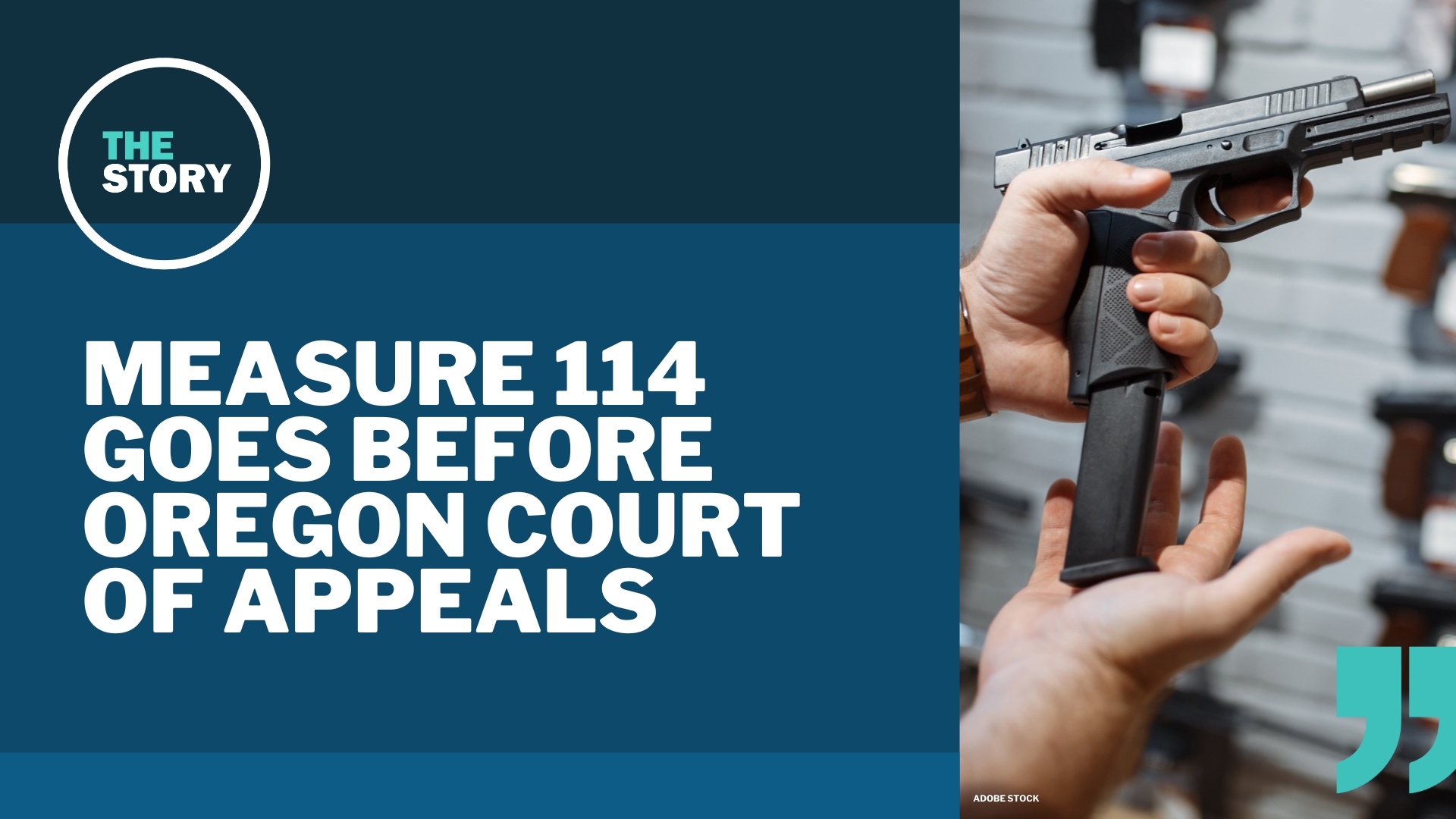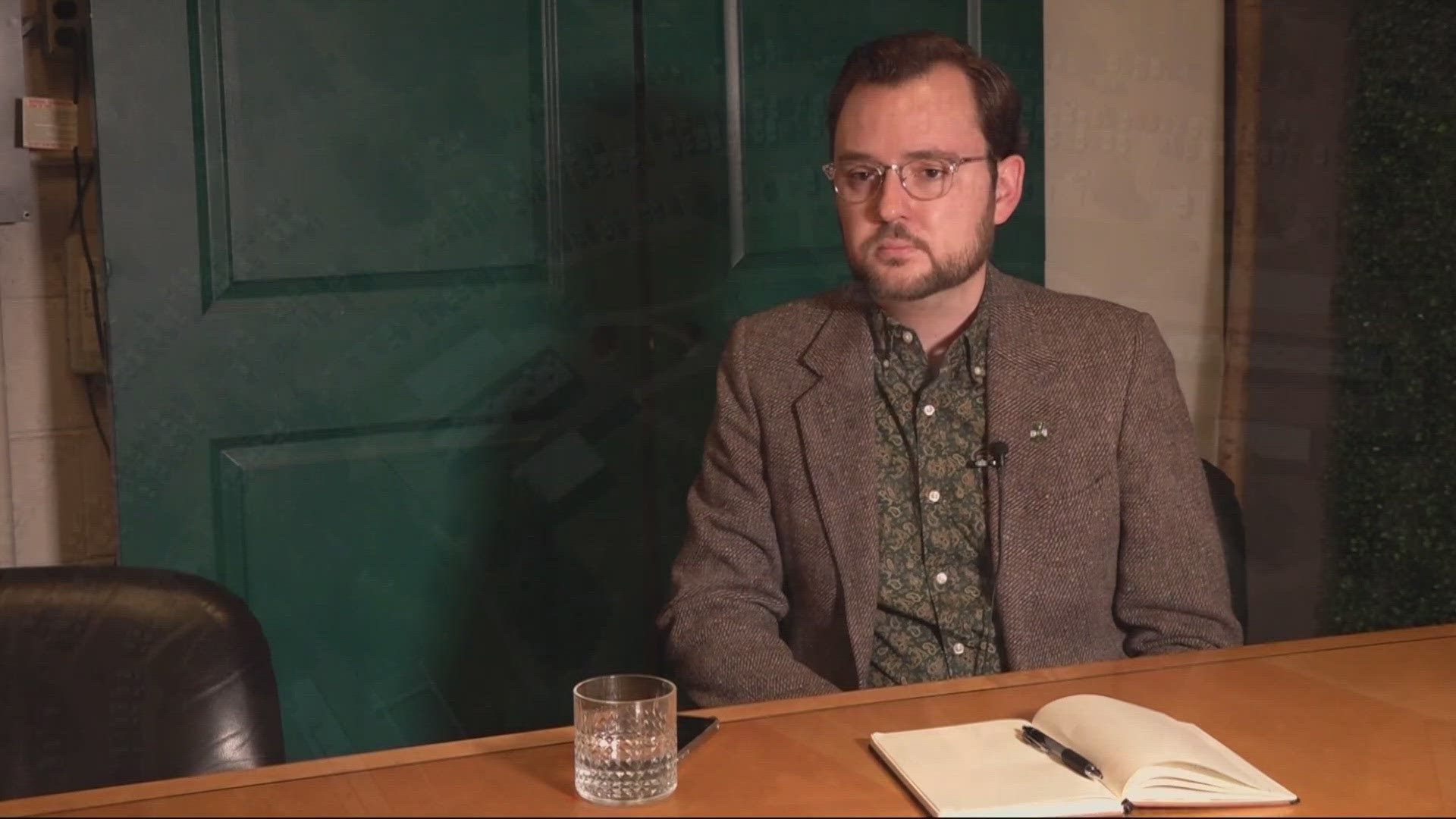OREGON, USA — Though Measure 114 is not on this November's ballot, the controversial gun control law is still in the ether. The voter-approved law has never taken effect, having been mired in series of court challenges ever since it passed two years ago.
This week, arguments to try and revive the law were presented to a panel of judges at the Oregon Court of Appeals.
Oregonians narrowly passed Measure 114 the first time around, back in 2022, with 50.7% voting "yes." The law states that a gun's magazine cannot hold more than 10 rounds, establishes that prospective gun owners must receive a permit to buy a gun, and requires a gun safety class to get that permit. The law also keeps the gun from being given to a buyer until after a background check is finished.
Currently, there is no limit on the size of a magazine, no permit required for purchase, and a gun can be given to the buyer after three business days, even if the background check is not yet finished.
In Dec. 2022, a month after the law passed, two gun owners in Harney County in eastern Oregon filed a lawsuit to block it — and it's been on hold ever since.
Last year, a Harney County judge ruled that the part of the law limiting how many rounds can be held in the gun's magazine and the requirement to get a permit for purchase violated the Oregon Constitution, which protects the right to own guns. The state then appealed that ruling, which is how the attorneys ended up standing in front of a three-judge panel from the Oregon Court of Appeals earlier this week.
From a certain perspective
The state's attorney, who is arguing that Measure 114 is constitutional and should be allowed to take effect, faced off with the gun owners' attorney, who argued Measure 114 is not constitutional and should not be allowed to take effect.
In part, the two sides are arguing about how the case should be reviewed by the appellate court, hinging on two legal terms: "facial challenge" and "de novo."
A facial challenge describes how a law is being challenged. Lawyers can argue that the law is unconstitutional when applied to a specific set of facts; that is called an "as applied" challenge. But a facial challenge is broader, meaning that the party is arguing that the law is always unconstitutional on its face when applied to any set of specific facts.
That's the angle the state's lawyer is approaching from: that their opponents have challenged the constitutionality of Measure 114, meaning that it cannot be constitutionally applied in any scenario. The U.S. Supreme Court has said a facial challenge is more difficult to win.
Meanwhile, the gun owners' attorney is arguing against the de novo approach. "De novo" is a Latin phrase that means "from the beginning" or "anew." If the court of appeals decides to look at this case "de novo," it means they will examine the entire thing, as if the first court — the trial court — never existed. Otherwise, they would be restricted to looking at just what the first court did and if that judge made mistakes.
So, the gun owners' attorney is arguing that this case should only be reviewed to see if there were factual errors, which would make it easier to keep the Harney County judge's ruling from being overturned.
But Judge Kristina Hellman challenged him on looking at the case from the "de novo" standard of review.
Essentially, this first round asked: Can the three-judge panel look at this case as if it's the first time it's been in court? Or are they restricted to just looking at what the Harney County judge did and checking to see if there was a factual error? Lastly, is the argument that the law is unconstitutional all the time or just under certain circumstances?
'No weapon forged can stop me' vs. 'That was then, this is now'
Later in the arguments, the state's lawyer explained to the judges why Measure 114's restriction on the size of a magazine should not be unconstitutional — harkening back all the way to the 1850s, as Oregon was approaching statehood.
Essentially, the state's lawyer argued that the guns of yore are different from today's modern military machines. The capacity of a firearm back then was limited on how many rounds it could fire, and the older models more commonly used for self-defense; think pepperbox pistols or Colt revolvers, the latter having a capacity between four to eight rounds. In Oregon, that most commonly took the form of a single-shot flintlock rifle at the time, the attorney argued.
"Contrast that with a modern day, large-capacity magazine, which only evolved because of three separate technological innovations in the 1880s, two of them for military purposes," the state's lawyer said.
Thus, the big guns, he argued, don't qualify under Article 1, Section 27 of the Oregon Constitution, "because it's not personal self-defense." Unlike the guns of yore, when it would take several minutes to reload because the wielder "individually had to load primer propellant and projectile into each barrel or chamber."
But today's machinery?
"I point this court to Las Vegas, the Route 91 Music Festival, (where) a single shooter shot more than 1,000 rounds into a crowd of concertgoers in the span of 11 minutes. In one 60-second span, he shot 298 rounds, ultimately killing 58 and injuring more than 800. Those are very distinct technologies and military-type weaponry ... like a modern day, large-capacity magazine does not qualify for constitutional protection," he said.
On the other side, the gun owners' attorney argued that the requirement that gun owners get a permit and go through a second background check, alongside the federal background check that already happens, is unconstitutional because it includes everyone.
"In this case, the law is not aimed at any dangerous practice ... the Supreme Court has put really a really narrow scope around who you're able to restrict, who the government is allowed to restrict from accessing firearms," the attorney argued.
There's already a law that prevents felons from accessing firearms, the gun owners' attorney said, which is legal because the Oregon Legislature "designated a certain class of persons as inherently dangerous."
But Measure 114 demands a second background check, in addition to the already standardized FBI fingerprint background check. The gun owners' attorney argued that it is "unnecessary" for all Oregonians to go through the process, including training, to access firearms, and the government does not have the authority to interfere.
"Basically, you're presumed guilty or unfit until you prove otherwise to the government," the gun owners' attorney concluded.
What's next?
Even after the Court of Appeals rules, Measure 114 will next go to the Oregon Supreme Court.
At the same time, another challenge in federal court is making its way through the system, as a federal judge in Portland had ruled the law does not violate the U.S. Constitution, but that case is eventually expected to make its way to the U.S. Supreme Court.
In short: Oregonians will likely have months — if not years — of litigation left before a final answer.


